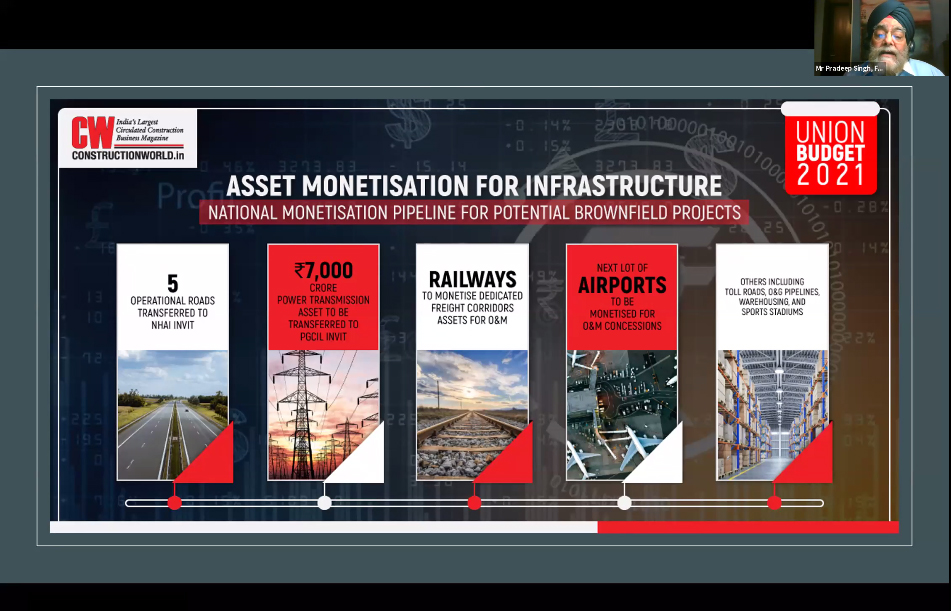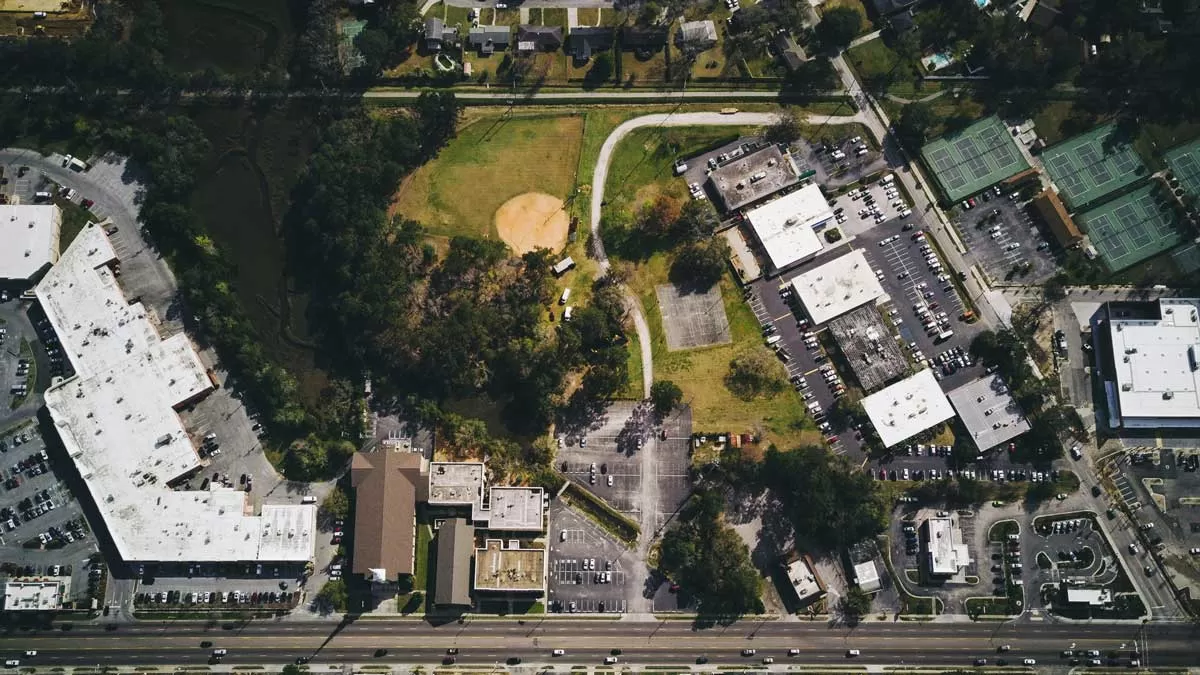In
a webinar hosted by Construction
World and FIRST Construction Council yesterday, experts churned the
Union Budget 2021-22 to decode what it means in funding and implementation of
projects.
_________
Construction World and FIRST Construction Council organised a webinar
with prominent analysts and industry captains on February 2, the day after
Finance Minister Nirmala Sitharaman’s Union Budget 2021-22 speech.
The speakers were:
·
Deepto
Roy, Partner, Shardul Amarchand Mangaldas & Co
·
Dip
Kishore Sen, Director, L&T
·
Hemal
Mehta, Partner, Deloitte India
·
Pradeep
Singh, former Vice Chairman & MD, IDFC Projects
·
Sandeep
Singh, MD, Tata Hitachi
·
Sumit
Banerjee, former MD & CEO, ACC Ltd
The 90-minute session was moderated
by Construction World’s
Editor-in-Chief Pratap Padode.
Budgets over the years have
emphasised on infrastructure, but this budget hit the bull’s eye by
specifically allocating funds for infrastructure. Governments have dabbled in
public-private partnerships (PPP) in infrastructure projects, and experimented
with different methods of the workings of PPP. Arbitration mechanisms take
forever, and often, government-related issues such as land acquisition are
tricky for the private contractors and partners.
But as the industry finds itself in
the throes of a post-pandemic pain, these finance-, execution-, and related
issues take an even more significant role. Did the Union Budget 2021-22 make a
difference to how projects will be implemented? What were some of the hits and
more importantly, some misses? What are some loopholes and potential pitfalls?
In this article, we report on what
experts on our panel said about project execution.
Project acceleration
Order
book positions seem to be in a promising mode as the companies are expecting a
huge amount of order to swell up their books post-pandemic. Which sectors do
the experts see most promising from the contractor’s perspective?
DK
Sen, Director, L&T, says order books are growing in
infrastructure--railway, roads, aviation, and metro. But it would be a
combination of industries, Sen said, thanks to the new economic corridors that the FM announced:
“The corridors will be the engines
of growth not just in terms of logistics itself, but in terms of other commercial
and residential opportunities. These are long corridors that connect important
cities and pass through underdeveloped, and that should lead to development
along the corridor.” The government has announced several corridors such as
Delhi-Dehradun, Kanpur-Lucknow, Chennai-Salem, Raipur-Visakhapatnam. All these
corridors are about 500-600 km long and will connect several major cities.
The
government’s announcement of new Dedicated Freight Corridors (DFCs) and
high-speed rail is welcome. It seems that the authorities are fully
prepared--tender papers are ready, and since it is all JICA-funded, this looks
good, Sen said. “Whether they will be able to get the money from the market
through monetisation is doubtful. Yet, emerging from a pandemic year, investment
of Rs 5 lakh crore is a very good move. It’s a tall order, but the FM’s
attitude is one of confidence.”
Sen added, “Apart from this they
also have ambitious high-speed rail where they have just awarded two packages.
And now there are a whole load of packages because the whole outlay is about Rs
100,000 crore out of which only about Rs 35,000 crore have been awarded. There
will be huge scope in that and the way the government is going the high-speed
rail authority is very is fully prepared as they have been working on this
project for a long time.”
As Deepto
Roy, Partner, Shardul Amarchand Mangaldas & Co, a
law firm, said in
the webinar, the government seems to have realised that one of the key drivers
of this government’s new slogan Atmanirbharta—or
self-reliance—is world-class infrastructure, and is identifying sectors to make
significant capital allocations.
Roy said, “Previous budgets used to
talk in more hypothetical terms. But this budget identifies certain sectors,
and a roadmap has been laid down for each of those sectors.”
The emphasis was given to
transportation, in particular, roads, railways, and urban infra. All this specific identification and funds
allocation according to Roy, “gives the impression that the government intends
to do much in a very short while.”
He goes on to add that a fair
amount of emphasis has been laid on the power
sector reform, particularly on the distribution side. The government has
identified discoms as a piece of the “electricity puzzle”, which needs urgent
intervention especially in modernising distribution infrastructure on the
energy side.
Revenue mobilisation strategy
The government is deploying a
strategy to eliminate the problem of infrastructure financing faced by the
Indian infrastructure sector. REITs (Real Estate Investment Trusts) and InVits
(Infrastructure Investment Trusts) will now be open to debt financing by foreign
players. to set up a development financial institution (DFI). The FM sees this
opening up to be a major enabler in financing real estate and infrastructure
projects to accelerate growth in these sectors. But will they?
Pratap
Padode, Editor-in-Chief, Construction
World, pointed out, “Private
capital was shy even before pandemic. Public spending needs to be high and the stage
needs to be set. Yet with asset monetisation, InvITS, REITS and other
processes, is the stage set for private monetisation to come back? This is an
operation clean up but why does the situation reach this point? Is it because
of the risk associated with projects?”
Sandeep
Singh, MD, Tata Hitachi, said
the production-linked incentives, or PLIs, which the government has recently
announced for a few industries, are already in place. “States will do very well
with their own incentives--especially states like Tamil Nadu and Karnataka,
which have been aggressive in rolling out the carpet for investment.”
Hemal
Mehta, Partner, Deloitte India, said
he believed PLIs are “good for new manufacturing units, not so much with
existing ones.”
Pradeep Singh, Former Vice
Chairman & MD, IDFC Projects, said, “Revenue mobilisation strategy is good news
and bad news. It relies on monetisation of government assets including
infrastructure projects, especially brownfield
projects.”
Roy believes that the
“‘InVitisation’ risk could be hedged by investing and exiting later, with a
professional O&M coming in.”
“This Budget is a mixed bag,” Singh
went on to say. “The government’s commitment to monetisation of assets,
especially brownfield, is a renewed and bold move especially in the face of
criticism that the government leans towards the corporate sector. “Disinvestment, which is on the same
continuum disinvestment in public sector undertakings, including significant
land holdings, has been again identified very clearly as an intervention.” A
special purpose vehicle (SPV) is proposed to be set up to be able to mastermind
that transaction.
Bringing in the private sector into
infrastructure is welcome, Singh said, but the experience has been mixed—with a
rise in NPAs and even failures among
players.
The PPP strategy as previously
envisaged, too, Singh believes, seems to be getting lost, perhaps because of
that mixed experience:
He further added, “So the
government seems to be pragmatically accepting that the development and
execution risks associated with infrastructure projects are just simply too
high for the private sector. Bringing in the private sector to brownfield
projects, which are projects developed by the government executed by the
government to monetise those projects to recycle the capital, but in the
process, bring private sector efficiencies and management for the operation and
management and maintenance of those very projects, and take some residual
commercial risks of the future revenue generation and the management of costs
of all those projects. So in that sense, it's good news that the government
being pragmatic.”
But the flip side to this is that
in the process, the government seems to be no longer focusing on addressing the
fundamental challenges that lead to these failures of PPP in its full form,
where the commercial projects are developed and financed by commercial capital.
The good things about the PPP strategy seem to be getting lost. Many of these
underlying challenges are in the domain of public policy. Singh adds, “The
government should also bite the bullet and start addressing those challenges,
rather than just throwing away the baby with the bathwater and focusing on
brownfield monetisation, which by itself is welcome.
Mediation, not arbitration?
India ranks 163rd in the
enforcement of contracts in ease of doing business, although India’s rank in
ease of doing business is 63rd, where does the problem lie? How effective is
arbitration as a choice of dispute resolution?
Enforcing a contract is nothing but
a resolution of disputes in one way or the other. And India does have a strong
legal framework in place but the problem is with the execution of the rule of
law.
For dispute resolution, the
government has taken a few positive steps like making mediation mandatory. But
according to Banerjee, “there remain
few flaws in that law, which doesn't make it mandatory. And people are
bypassing it by taking injunctions etc,” Every commercial dispute should go
through mediation, not arbitration because Banerjee feels that arbitration
doesn't solve anything as arbitration can also be long-winded and ultimately
land up through the whole court route into the Supreme Court. It adds more
years to the resolution process. He added, “Mediation is the one which in
western countries have become fashionable. And so in India, also we have to
make it fashionable.”


















